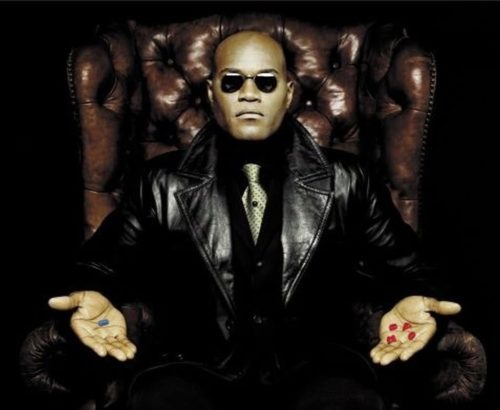
The phrase “to get redpilled” means to get woken up, usually painfully, to the true nature of things, especially in the context of having previously believed something that wasn’t true. It comes from the famous scene in the 1999 film The Matrix.
In the scene, Morpheus offers Neo (played by Keanu Reeves) two pills: a blue one and a red one. If he takes the blue one, he will wake up again in his ordinary life having forgotten that he ever realised there was anything unusual about it. If he takes the red one, he wakes up into the real world, which is, of course, the foundational reality underneath the matrix.
And there, as Morpheus puts it: “We see how deep this rabbit hole goes.”
It is thus slightly different to merely learning something through suffering, which is a superset to the specific case of learning that something previously thought to be true was in fact false.
This means that the red pill, and the phrase “to become redpilled” is the modern expression of an ancient sentiment. It is how 21st century people talk about having taken some steps along the shamanic path – the path for those who have seen beyond.
Usually a person gets redpilled by being treated much worse than they expected to be by an authority figure, and thereby becoming aware that the promises of solidarity from those authority figures – promises which are the very foundation of that authority – are worthless.
Many young people are redpilled by the Police. There are two major ways this happens.
The first is getting arrested for something like using medicinal cannabis. Getting put in a cage for using a medicine that improves your mental health immediately liberates a person from the illusion that the Police are there to protect and serve the citizenry.
The second way is by taking a complaint to the Police and being told to fuck off. This has forever been the case if one was a woman reporting the domestic violence of one’s husband, or a racial minority reporting being abused by one’s employer.
People are also redpilled by doctors. Telling a doctor about how cannabis is an effective medicine for your condition, only to be told to fuck off because the doctor makes more money out of pharmaceuticals than they ever could out of cannabis, will redpill anyone.
And, of course, most people have been redpilled by politicians, because one only needs to live through two electoral cycles to have seen all this shit before.
The Greatest and Silent Generations were redpilled by the Great Depression and by World War II. The Baby Boomers were redpilled by Vietnam and by the Drug War. Generation X were redpilled by the War of Terror and also by the Drug War.
Fundamentally, to get redpilled is to see beyond social conditioning. It is when one realises that the cozy patchwork of moral values in which one had wrapped oneself in was nothing more than a half-arsed convenience arrived at by one’s lack of intellectual capacity.
It is when you see beyond the comfortable little paradigm that your local authority figure knows what’s best for their people under their control.
It is when you realise that your working with the system simply and necessarily perpetuates it, and usually to your detriment.
It is when you realise that you have the freedom to choose your attitude to reality and thereby the consequences that come with that.
If a person gets redpilled from their social conditioning, this is the same as seeing beyond. And so writing “for those who have seen beyond” is also writing for those who have been redpilled.
This also means that any of the traditional shamanic methods for seeing beyond – psychoactive drugs, sensory deprivation, vision quests, sleep deprivation, rhythmic music, sexual ecstasy, fasting, meditation – are all potentially ways to redpill oneself.



